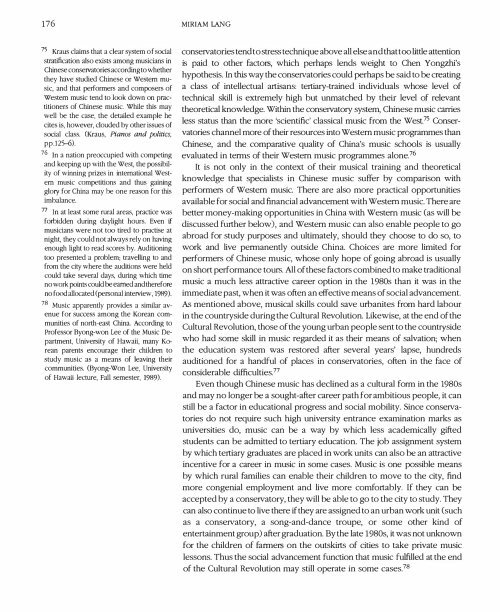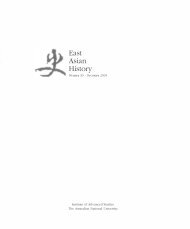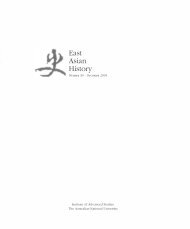Observations from a Film - (Miriam Lang) (PDF ... - East Asian History
Observations from a Film - (Miriam Lang) (PDF ... - East Asian History
Observations from a Film - (Miriam Lang) (PDF ... - East Asian History
- No tags were found...
Create successful ePaper yourself
Turn your PDF publications into a flip-book with our unique Google optimized e-Paper software.
176MIRIAM LANG75 Kraus claims that a clear system of socialstratification also exists among musicians inChinese conservatories according to whetherthey have studied Chinese or Western music,and that performers and composers ofWestern music tend to look down on practitionersof Chinese music. While this maywell be the case, the detailed example hecites is, however, clouded by other issues ofsocial class. (Kraus, Pianos and politiCS,pp.12s-6).76 In a nation preoccupied with competingand keeping up with the West, the possibilityof winning prizes in international Westernmusic competitions and thus gaininggloty for China may be one reason for thisimbalance.77 In at Ie-JSt some rural areas, practice wasforbidden during daylight hours. Even ifmusicians were not too tired to practise atnight, they could not always rely on havingenough light to read scores by. Auditioningtoo presented a problem; travelling to and<strong>from</strong> the city where the auditions were heldcould take several days, during which timeno work points could be earned and thereforeno food allocated (personal interview, 1989).78 Music apparently provides a similar avenuefor success among the Korean communitiesof north-east China. According toProfessor Byong-won Lee of the Music Department,University of Hawaii, many Korean parents encourage their children tostudy music as a means of leaving theircommunities. (Byong-Won Lee, Universityof Hawaii lecture, Fall semester, 1989).conservatories tend to stress technique above all else and that too little attentionis paid to other factors, which perhaps lends weight to Chen Yongzhi'shypothesis. In this way the conservatories could perhaps be said to be creatinga class of intellectual artisans: tertiary-trained individuals whose level oftechnical skill is extremely high but unmatched by their level of relevanttheoretical knowledge. Within the conservatory system, Chinese music carriesless status than the more 'scientific' classical music <strong>from</strong> the West?5 Conservatorieschannel more of their resources into Westem music programmes thanChinese, and the comparative quality of China's music schools is usuallyevaluated in terms of their Westem music programmes alone?6It is not only in the context of their musical training and theoreticalknowledge that specialists in Chinese music suffer by comparison withperformers of Westem music. There are also more practical opportunitiesavailable for social and financial advancement with Western music. There arebetter money-making opportunities in China with Western music (as will bediscussed further below), and Westem music can also enable people to goabroad for study purposes and ultimately, should they choose to do so, towork and live permanently outside China. Choices are more limited forperformers of Chinese music, whose only hope of going abroad is usuallyon short performance tours. All of these factors combined to make traditionalmusic a much less attractive career option in the 1980s than it was in theimmediate past, when it was often an effective means of social advancement.As mentioned above, musical skills could save urbanites <strong>from</strong> hard labourin the countryside during the Cultural Revolution. Likewise, at the end of theCultural Revolution, those of the young urban people sent to the countrysidewho had some skill in music regarded it as their means of salvation; whenthe education system was restored after several years' lapse, hundredsauditioned for a handful of places in conservatories, often in the face ofconsiderable difficulties.77Even though Chinese music has declined as a cultural form in the 1980sand may no longer be a sought-after career path for ambitious people, it canstill be a factor in educational progress and social mobility. Since conservatoriesdo not require such high university entrance examination marks asuniversities do, music can be a way by which less academically giftedstudents can be admitted to tertiary education. The job assignment systemby which tertiary graduates are placed in work units can also be an attractiveincentive for a career in music in some cases. Music is one possible meansby which rural families can enable their children to move to the city, findmore congenial employment and live more comfortably. If they can beaccepted by a conservatory, they will be able to go to the city to study. Theycan also continue to live there if they are assigned to an urban work unit (suchas a conservatory, a song-and-dance troupe, or some other kind ofentertainment grou p) after graduation. By the late 1980s, it was not unknownfor the children of farmers on the outskirts of cities to take private musiclessons. Thus the social advancement function that music fulfilled at the endof the Cultural Revolution may still operate in some cases.78
















